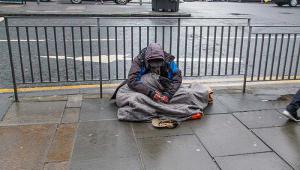The Office for National Statistics has found that in the most deprived 10% of local areas, the rate of deaths was 9.2 times higher than that of the least deprived 10%.
The ONS data showed the authorities with the highest number of deaths of homeless people in 2017 were Manchester (21 deaths), Birmingham (18), Lambeth (17), Liverpool (17) and Bristol (17).
Birmingham has consistently been in the top two for homeless deaths since the dataset started in 2013.
The top five local authorities with the highest deaths of homeless per 100,000 population in 2017 were Blackburn with Darwen (10.2), Oxford (8.1), Camden (7.4), Barrow-in-furness (7.3) and Canterbury (6.8).
Polly Neate, chief executive of the homeless charity Shelter, said the figures should be a “wake-up call”.
“There is nothing inevitable about people dying homeless, it is a direct consequence of a broken housing system,” she said.
“When more and more people have no choice but to sleep on the street, we see the absolute sharpest end of the housing emergency. Unstable and expensive private renting, welfare cuts and a severe lack of social housing are fundamentally at the root of this crisis,” Neate added.
Neate called for the government to ensure housing benefit can cover rents and to “urgently” increase the building of social homes.
A Shelter commissioned report from January urged the government to build three million new social homes over a 20 year period.
The highest estimated number of homeless deaths for any local authority in any year (between 2013 and 2017) was Camden, in 2016, with 23.
Jon Sparkes, chief executive of homeless charity Crisis, said: “Government must ensure local authorities, particularly in the most deprived areas, have the appropriate funding to conduct reviews into the death of every person who has died while homeless, to prevent more people from dying needlessly.
“They must also make sure that when people do become homeless, they are rehoused quickly and with the support they need to keep their homes, whether it’s help to find employment, mental health support or drug and alcohol services.”
Communities secretary James Brokenshire said: “Every death on our streets is one too many and it is simply unacceptable to see lives cut short this way.
“That’s why we are investing £1.2bn to tackle homelessness and have bold plans backed by £100m to end rough sleeping for good.”
In January, figures from the ONS showed that the number of deaths of homeless people in England and Wales increased by nearly a quarter over the last five years.











